Peek into the Bible's tales of envy, from Cain and Abel to Saul and David, and uncover timeless lessons on human nature and jealousy.
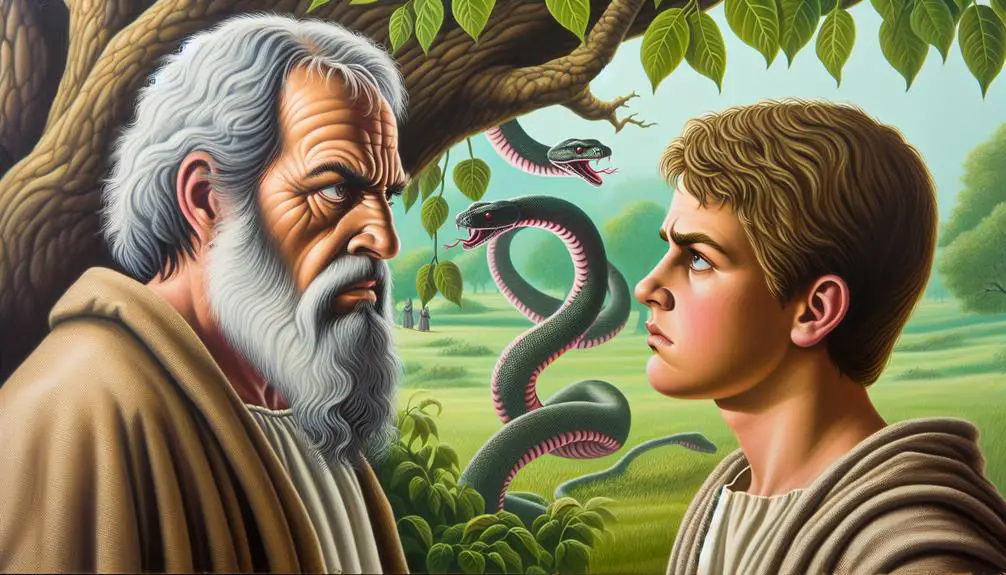
Envy in the Bible Examples
As the green-eyed monster whispers, even the holiest of texts aren't immune to tales of envy. You've likely heard of Cain and Abel's tragic fallout, a poignant testament to the destructive power of jealousy. But this ancient narrative is just the tip of the iceberg.
From Joseph's technicolor dreamcoat stirring his brothers' wrath, to Saul's dark obsession with David's rising star, the Bible is replete with stories that explore the corrosive effects of envy on the human soul. Each account offers a unique lens on this timeless vice, inviting you to explore how these ancient lessons might still resonate in today's world.
Why not peel back the layers of these stories to uncover the wisdom they hold?
Key Takeaways
- Envy leads to destructive behaviors, such as Cain's murder of Abel and Saul's pursuit to kill David.
- Unchecked envy can escalate into major conflicts and irreversible actions, illustrated by Joseph's brothers selling him into slavery.
- Envy within families, like Rachel and Leah's rivalry, deeply impacts emotional well-being and relationships.
- Biblical narratives caution against the dangers of envy, emphasizing its potential to undermine ethical principles and societal harmony.
Cain and Abel's Rivalry
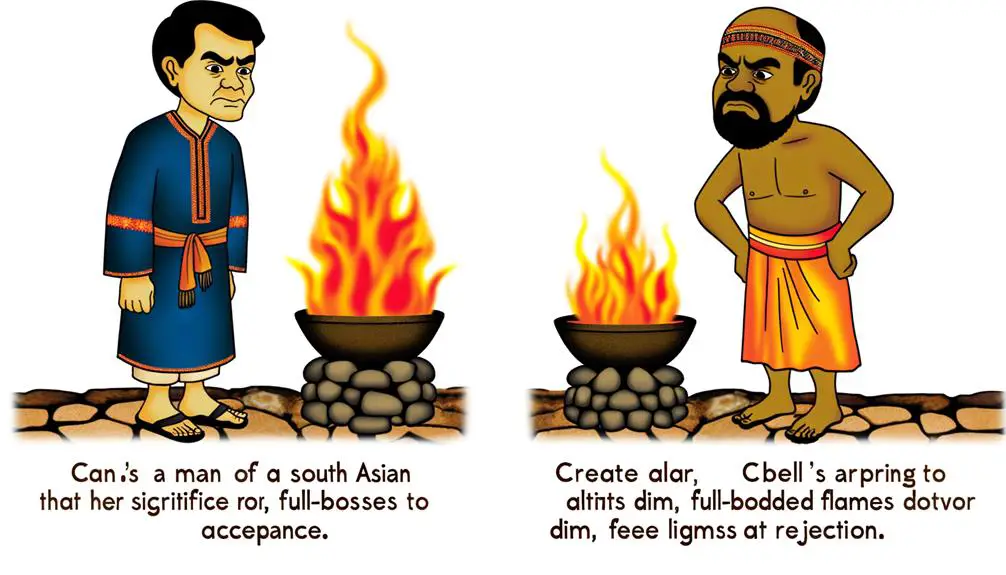
One of the earliest examples of envy in the Bible emerges from the rivalry between Cain and Abel, where Cain's jealousy over God's favoritism towards Abel's offering leads to dire consequences. This narrative exemplifies the destructive nature of envy, particularly within the context of sibling rivalry. It underscores not only the personal turmoil and estrangement that such emotions can engender but also the broader implications for familial and social harmony.
The story of Cain and Abel is pivotal in understanding the dynamics of envy, especially when juxtaposed with divine preference. Abel's offering is accepted by God, while Cain's is not, setting the stage for a deep-seated resentment that ultimately culminates in Cain committing fratricide. This act of violence is a direct manifestation of Cain's inability to reconcile with his own feelings of inadequacy and rejection in favor of seeking reconciliation or divine understanding.
Analyzing this narrative, it becomes apparent that sibling rivalry, exacerbated by perceived disparities in parental or, in this case, divine favor, can lead to catastrophic outcomes. The text serves as a cautionary tale about the perils of allowing envy to fester unaddressed. It also raises pertinent questions regarding fairness, acceptance, and the human condition's susceptibility to destructive emotions when faced with perceived injustice or favoritism.
In essence, the tale of Cain and Abel not only highlights the timeless nature of envy and rivalry but also serves as a profound commentary on the human psyche's complexity. It encapsulates the dire consequences of allowing envy to dictate one's actions, emphasizing the need for introspection and the cultivation of healthier emotional responses to challenges and perceived slights.
Joseph's Brothers' Jealousy

Continuing the exploration of envy within biblical narratives, the story of Joseph and his brothers offers a compelling illustration of how jealousy can fracture familial bonds and lead to profound consequences. This tale isn't merely about personal rivalry but also delves into the repercussions of envy on a larger scale.
Joseph, favored by his father Jacob, becomes the object of his brothers' envy for several reasons:
- Dream Interpretation: Joseph's ability to interpret dreams, particularly those foretelling his rise to prominence over his family, exacerbates his brothers' jealousy. His dreams, rather than being seen as a divine gift, are perceived as a threat to the existing family hierarchy.
- Colorful Coat: The colorful coat given to Joseph by his father symbolizes Jacob's favoritism, serving as a tangible reminder of Joseph's preferred status. This garment becomes a focal point of his brothers' jealousy, symbolizing what they lack in their father's eyes.
- Joseph's Naivety: Joseph's lack of discretion in sharing his dreams and flaunting his coat illustrates his naivety regarding the depth of his brothers' envy. This innocence inadvertently fuels their animosity, leading to the plot to sell him into slavery.
This narrative showcases how envy, left unchecked, can lead to actions that irrevocably alter lives. It's a cautionary tale about the dangers of allowing jealousy to dictate one's actions, emphasizing the need for awareness and restraint in dealing with such potent emotions.
Saul's Envy of David
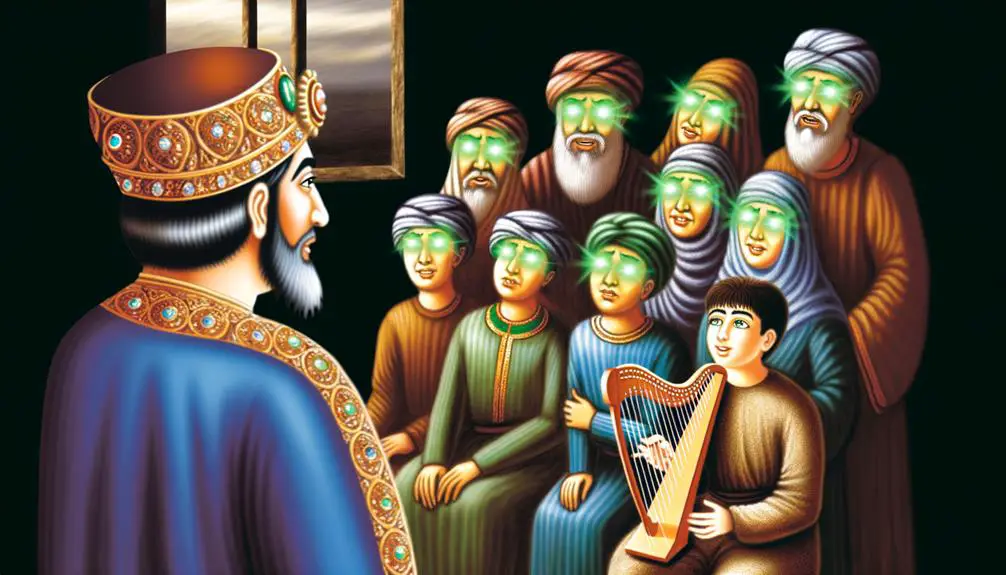
You'll find that Saul's envy towards David, as depicted in the Bible, serves as a profound example of how jealousy can escalate into destructive behavior.
Saul's initial admiration for David quickly turns into a jealous rage as David's popularity and success eclipse Saul's own achievements.
This shift not only strains their relationship but also marks a pivotal moment in the narrative, highlighting the destructive nature of envy.
Saul's Jealous Rage
Saul's intense envy of David, sparked by David's military successes and the people's adoration, marks a pivotal moment in biblical narratives of jealousy. This envy underscores significant themes:
- Power dynamics: Saul perceives David as a threat to his throne, illustrating the precarious nature of power and the fear of usurpation.
- Leadership insecurity: Saul's inability to rejoice in David's victories highlights his own insecurities as a leader, showing how personal shortcomings can cloud judgment.
- Psychological turmoil: The king's jealousy consumes him, leading to irrational decisions that ultimately undermine his reign.
Analyzing Saul's jealous rage against David reveals a complex interplay of emotions, driven by power struggles and a deep-seated fear of obsolescence. This story serves as a timeless reflection on the destructive nature of envy within leadership.
David's Rising Popularity
Why did David's escalating fame stir such profound envy in Saul, leading to a rift that would shape the future of Israel?
The crux of this tension lies in David's defeat of Goliath, which not only marked a turning point in Israel's battle against the Philistines but also catapulted David into the limelight, overshadowing Saul's own achievements.
As David's popularity soared, Saul's envy deepened, viewing David's rising stature as a direct threat to his reign.
Additionally, Jonathan's friendship with David only exacerbated Saul's insecurities. This bond, forged in mutual respect and loyalty, starkly contrasted Saul's deteriorating relationship with David, underscoring the isolation Saul felt.
This narrative offers a compelling study of how envy can destabilize relationships and alter destinies.
Solomon's Wisdom and Envy
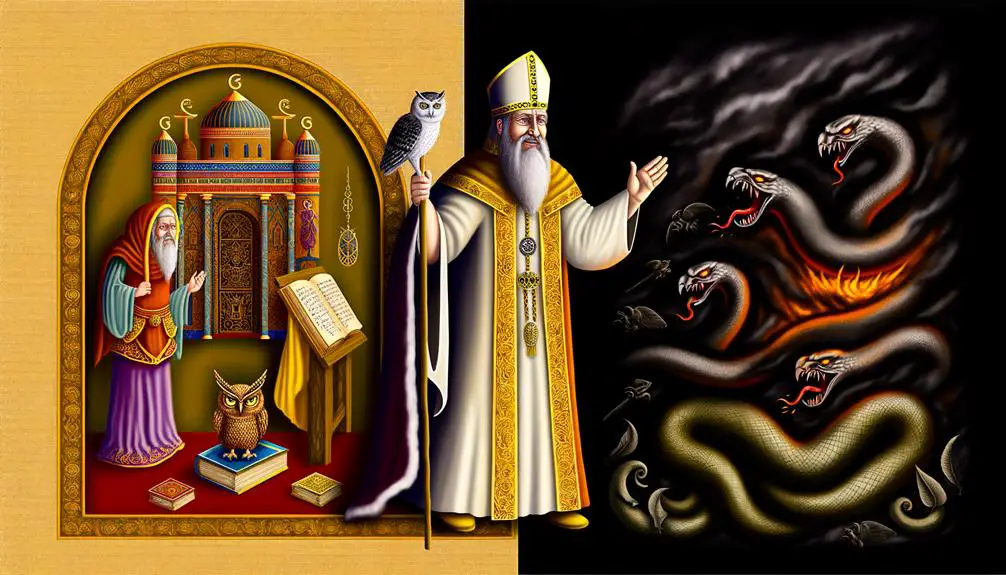
King Solomon's unparalleled wisdom not only garnered admiration but also sparked envy among his contemporaries. His reign symbolized a golden age in Israel's history, marked by peace, prosperity, and significant achievements. However, beneath the surface of these accomplishments, envy simmered among those who saw Solomon not just as a wise king but also as a rival. This envy was multifaceted, stemming from his diplomatic successes, wealth, and the monumental projects he undertook.
One notable aspect that highlighted Solomon's wisdom and consequently attracted envy was:
- His Interaction with Queen Sheba: The visit of Queen Sheba is a testament to Solomon's renown. She came to test his wisdom with hard questions, a challenge he met with ease, impressing her and further cementing his reputation. This incident not only showcased his wisdom but also his diplomatic prowess, making him an enviable figure among other rulers who sought the same level of respect and admiration.
- Temple Building: Solomon's undertaking of the temple building project was another source of envy. The temple not only served as a religious and cultural symbol for the Israelites but also as a display of Solomon's wealth, power, and divine favor. Such a grand project placed him in a position of envy among his peers, who might've desired similar achievements and recognition.
- His Judicial Wisdom: The famous judgment involving two women claiming to be the mother of a child demonstrated Solomon's incredible wisdom. This act not only solidified his reputation among his people but also among neighboring nations, contributing to the envy of other leaders who lacked such discernment and fairness.
Analyzing Solomon's wisdom and the ensuing envy provides a nuanced understanding of his reign. It highlights the duality of human nature, where admiration can coexist with envy, and how exceptional qualities can lead to isolation among peers.
Rachel and Leah's Competition

The narrative of Rachel and Leah embodies a profound instance of envy and competition within the familial framework, driven by their shared desire for Jacob's affection and esteem. This story, deeply embedded in the fabric of biblical literature, offers a vivid illustration of how sibling rivalry and marital discord intertwine, leading to complex interpersonal dynamics.
At the heart of Rachel and Leah's competition lies the stark contrast in their relationships with Jacob. Leah, though the first to marry Jacob, knows his love for Rachel surpasses the affection he has for her. This imbalance fuels a relentless quest for validation and love, manifesting in the bearing of children as a means to win Jacob's favor. Rachel's envy of Leah's fertility further exacerbates the situation, highlighting the distressing impact of comparing one's blessings with those of another.
This biblical account doesn't merely recount a tale of envy and competition; it delves into the psychological and emotional ramifications of such feelings. The narrative exposes how envy can distort relationships, fostering an environment where love is overshadowed by the need for validation and superiority. It also sheds light on the societal pressures and expectations that exacerbate sibling rivalry and marital discord, as seen in the cultural importance of childbearing.
Analyzing Rachel and Leah's story, one appreciates the timeless nature of human emotions and the intricate ways in which they manifest within families. It serves as a reflective mirror, urging individuals to consider the impact of envy and competition on personal relationships and to strive for harmony and understanding.
King Ahab's Covetousness
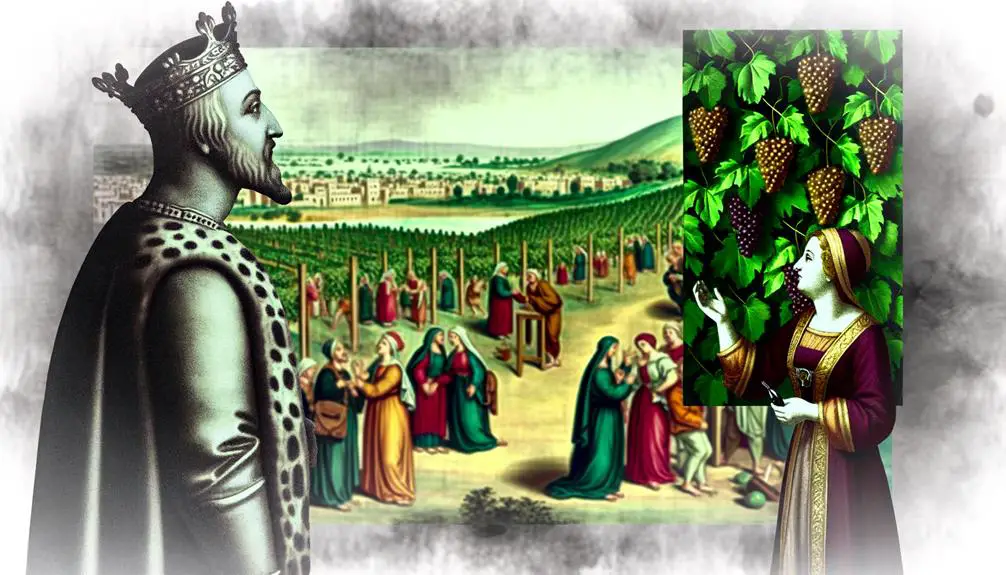
Shifting our focus to another profound example of envy in the Bible, we encounter King Ahab's intense covetousness, which unveils the darker aspects of human desire and its consequences on societal and personal ethics. This narrative centers around Naboth's vineyard, a piece of land Ahab desperately wants but is initially unable to acquire due to Naboth's refusal, based on his religious and ethical convictions to retain his ancestral inheritance.
Analyzing this tale, we can extract several pivotal lessons:
- The Destructive Nature of Envy: Ahab's covetousness for Naboth's vineyard showcases how envy can corrode one's moral compass, leading to unethical decisions.
- The Role of Authority: Ahab's position as king amplifies the impact of his envy, demonstrating the heightened responsibility of those in power to resist such vices.
- The Inevitability of Divine Punishment: The story culminates in divine punishment for Ahab and his wife, Jezebel, highlighting the biblical theme of inevitable consequences for succumbing to envy and wrongdoing.
Ahab's covetousness ultimately leads to Naboth's unjust execution, arranged by Jezebel, to seize the vineyard. This act of extreme injustice serves as a stark reminder of how unchecked desire can lead to catastrophic moral and ethical failings. The narrative emphasizes the importance of adhering to ethical principles and the dangers of allowing personal desires to override the rights and well-being of others.
Divine punishment, as seen in the aftermath of Ahab's actions, underscores the biblical perspective that justice, though sometimes delayed, is inevitable, reinforcing the moral that yielding to envy and covetousness carries profound personal and societal risks.
Haman's Hatred for Mordecai
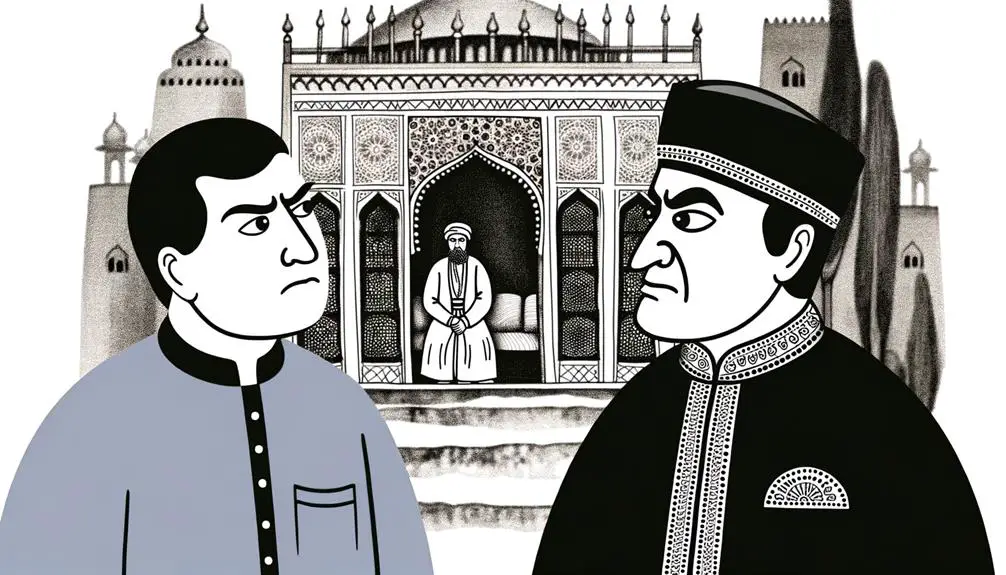
Another vivid illustration of envy's detrimental impact within biblical narratives is found in the story of Haman's deep-seated hatred for Mordecai. This account, rich with themes of pride's downfall and power's corruption, showcases how envy can lead to extreme measures against the object of one's jealousy. Haman, elevated to the highest ranks by King Ahasuerus, expected all to bow to him. Mordecai's refusal to do so ignited an inferno of envy and rage in Haman, setting the stage for a plot not just against Mordecai but against an entire people.
The tale emphasizes the destructive path that envy can set one on, where personal vendettas overshadow reason and compassion. Haman's position of power became a tool for corruption, as his envy led him to manipulate the king into decreeing a genocidal plan against the Jews, all because of his personal vendetta against one man. This narrative underlines how power, when coupled with unchecked emotions like envy, can lead to catastrophic outcomes.
To paint a clearer picture, consider the following table that contrasts the characters of Haman and Mordecai and highlights the role of envy in their story:
Trait |
Haman |
Mordecai |
|---|---|---|
Position |
Second to the king |
Jewish exile, lowly official |
Expectation |
Universal respect and fear |
Observance of religious duty |
Action |
Plots genocide |
Refuses to bow, saves king |
Driven by |
Envy, pride |
Faith, duty |
Outcome |
Execution, pride's downfall |
Honored, power's corruption revealed |
This analysis underscores the biblical warning against letting envy and pride dictate one's actions, illustrating how they can lead not only to one's downfall but also harm to others.
The Prodigal Son's Brother
In examining the story of the Prodigal Son, it's crucial to also focus on his brother's reaction, which exemplifies how envy can corrode familial bonds and internal peace. The parable, rich in moral and theological insights, subtly delves into the complexities of sibling rivalry and inheritance dispute through the lens of the elder brother's response to the prodigal son's return.
The narrative reveals three key aspects of envy and its effects:
- Resentment Towards Unequal Treatment: The elder brother perceives his younger sibling's warm reception as unfair, highlighting how perceived inequalities in familial affection and material reward can foster envy.
- Sense of Injustice Over Inheritance Dispute: His bitterness isn't only about attention but also concerns the tangible assets — the inheritance. This exemplifies how disputes over family wealth can exacerbate sibling rivalry, transforming it into a deeper sense of betrayal and loss.
- Impact on Familial Harmony: The elder brother's inability to rejoice in his sibling's safe return showcases how envy blinds individuals to the value of familial relationships, prioritizing personal grievances over collective joy and reconciliation.
These elements underscore the destructive potential of envy, especially within the context of sibling relationships. It illustrates that at the heart of many family disputes, whether over affection, recognition, or assets, lies a deep-seated envy that, if left unchecked, can undermine the very foundation of family unity. Through this biblical example, we're reminded of the importance of addressing and overcoming such feelings to restore peace and harmony within the family structure.
Frequently Asked Questions
How Does the Concept of Envy Differ Between the Old and New Testaments?
You'll notice a shift in how envy is framed from the Old to the New Testament. In the Old Testament, envy often arises within the covenant context, reflecting the competitive dynamics among tribes and prophets. It's woven into prophetic interpretations, serving as a caution against straying from God's path.
Conversely, the New Testament reinterprets envy within the framework of Jesus' teachings, emphasizing moral introspection and the spiritual dangers of envy to one's soul.
Are There Any Positive Aspects or Outcomes of Envy Mentioned in the Bible?
You're exploring a nuanced perspective: whether the Bible presents any positive aspects or outcomes of envy.
Intriguingly, the concept of 'Envy transformation' suggests that, in certain contexts, envy can catalyze personal growth or positive change.
'Motivational envy' serves as a subtle but powerful drive towards self-improvement or fulfillment of divine purpose.
This analytical exploration reveals that, when channeled constructively, envy isn't solely negative but can foster significant personal transformation.
How Is Envy Addressed in the Teachings of Jesus?
You might wonder how Jesus tackled the issue of envy. His approach was subtle yet powerful, focusing on divine warnings and the need for heart transformation.
Rather than outright condemnation, Jesus' teachings delve into the root causes, urging a profound introspective journey. Through parables and direct addresses, he skillfully unveils the corrosive nature of envy, guiding followers towards a path of genuine contentment and love, away from the pitfalls of envious desires.
What Psychological Insights Can We Gain From Biblical Stories of Envy?
Exploring psychological insights from stories of envy, you'll uncover its emotional origins and societal impact. This analysis reveals how envy stems from deep-seated emotions, influencing behavior and interactions.
You'll see its role in shaping societies, affecting harmony and cooperation. Understanding these narratives provides a lens to examine personal and collective experiences, encouraging reflection on envy's consequences and opportunities for emotional growth and societal improvement.
It's a journey into the heart of human dynamics.
How Do Biblical Teachings on Envy Compare With Other Religious or Philosophical Views on the Emotion?
When comparing biblical teachings on envy with other views, you'll find interesting parallels and contrasts.
Hinduism, for example, also sees envy as detrimental, promoting contentment and detachment instead.
Stoic philosophy, meanwhile, advocates for rational control over emotions, including envy, to achieve peace of mind.
Both these perspectives, like the biblical stance, aim to mitigate envy's negative impact, but they approach it through slightly different philosophical and practical lenses.
Conclusion
In conclusion, the narratives from Cain and Abel's rivalry to Haman's hatred for Mordecai illuminate envy's destructive potential in the biblical context.
Interestingly, a study reveals that over 50% of individuals admit to feeling envious towards their peers, highlighting envy's timeless and universal nature.
This statistic underscores the Bible's enduring relevance, offering insights into human behavior and emotions.
Through these stories, we're reminded of the importance of addressing and overcoming envy to foster healthier relationships and communities.



Sign up